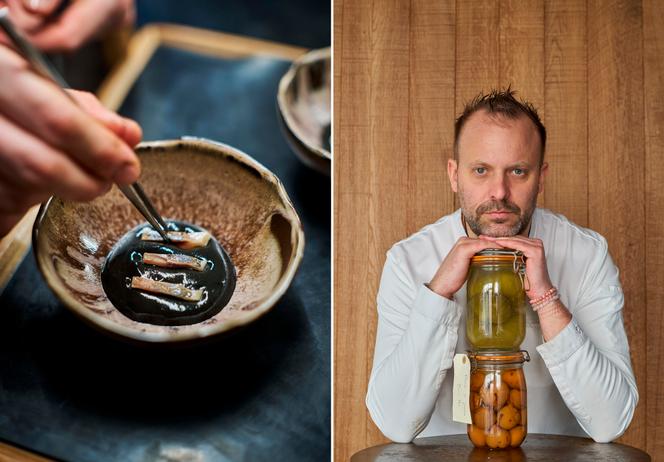


In a glazed terracotta bowl bathes a black creamy sesame cream prickled with bits of a hard-to-recognize fish. Dipping your spoon in for a taste, the fish is confited, salty and deliciously smoky, with a soft yet slightly oily texture – reminiscent of eel.
But no, David Toutain's smile widens. In the restaurant that bears his name in Paris, the delicacy he's been offering since the beginning of the year is a sort of gustatory illusion: herring that he confits and combines with smoked pike roe, as he now refuses to work with eel.
"For 13 years, I used to combine it with sesame. It even became a signature dish," he explained. "But like other chefs working in collaboration with the NGO Ethic Ocean, I'm committed to stop using it in my cooking. This species is in danger of extinction if we don't change our practices."
The two Michelin-starred chef confessed that his environmental awareness is a recent development. "I used to pay attention to the seasonality of fruit and vegetables, less to that of fish," he said. "Today, I provide clear lists of what I do and don't want. I'm not the only one paying attention to it. Beautiful bistros like Le Bon Georges in Paris's 9th arrondissement share the same philosophy. They buy in limited quantities and cross the dish of the day off the slate when the rations have run out."
There was a time when a good restaurant was synonymous with abundance. Nowadays, a quality establishment is defined above all by what it no longer offers. In Michelin-starred restaurants, red meat – with excessive consumption harming health and increasing the risk of cancer, not to mention its effect on the planet with greenhouse gas emissions – is offered in miniature slices. Some influential establishments, such as Geranium in Copenhagen, even do without it completely.
Exotic products, which also have a high carbon footprint, are no longer in favor. At the Auberge Sauvage, created in an old presbytery in the bay of Mont-Saint-Michel, chef Thomas Benady uses neither vanilla nor even chocolate. Avocados, which require massive amounts of water to grow, are also sometimes banned. A recipe for broccoli guacamole has even spread to many of the capital's environmentally responsible restaurants, from bistros like La Bagarre, which offers 100% French tacos, to gourmet tables like Galanga, managed by Thomas Danigo.
"If there were more transparency on the origin of products, I'm convinced many others would no longer be used," argued Clément Leroy. After working for a dozen years with Guy Savoy, the chef took over one of his mentor's emblematic addresses, Le Chiberta, near the Champs-Elysées. His menu follows the great French tradition while taking into account environmental issues: "The idea is to do more with less," he said.
You have 67.39% of this article left to read. The rest is for subscribers only.
